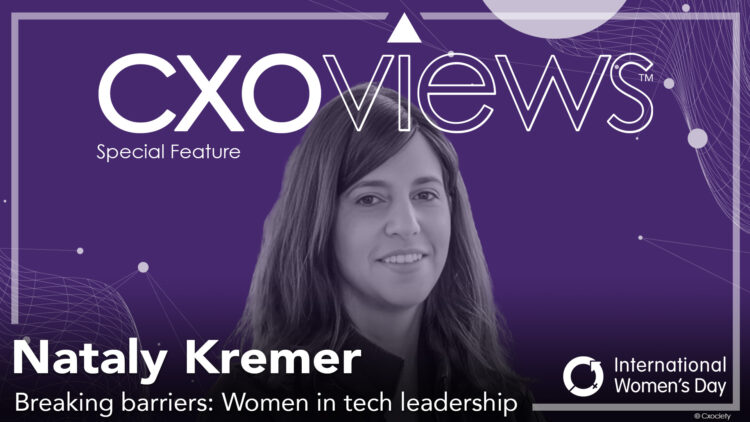"The numbers are shocking," reveals a global survey of women in tech, stating the stark reality of gender disparity in the industry. For every two men employed, there is only one woman. What's more, women earn less than men and are more likely to face gender-based discrimination.
At the current pace, closing the global economic gender gap will take 130 years—189 years in East Asia and the Pacific, the longest wait of any region.
Women in tech leadership are even rarer, with only 8-9% of women holding positions like CIO, CTO, or IT manager or serving as technical team leaders.
Despite the concerning statistics and the myriad of challenges, some women in tech leadership persevere, paving the way for other women to take their place in a male-dominated field. Their resilience and determination in pushing boundaries inspire others to do the same.
Inspiring journey

Take, for instance, the journey of Nataly Kremer, the chief product officer and head of R&D at Check Point. Her path to tech leadership was far from easy.
She admits that she did not see herself working in tech, having once believed in the stereotype of the profession involving dull days in a basement.
That changed when she entered the army.
"When I was in the army, I started to use technology systems. I didn't think they were very efficient. I went to the team that developed them and said, 'Hey, why wouldn't you do that?' And then they start changing things. I saw how fast you can change things to work better. I got so excited about that. "
She immediately went to the university to learn about technology. She studied for an MBA and BSc in Computer Science and Management from Tel Aviv University.
"When I started to learn, I immediately fell in love," she recalled.
And as they say, the rest was history.
Starting years
But it was not a smooth ride for Kremer as she sometimes felt discriminated against when she started.
"There were cases where I felt that the person in front of me would listen to me more if I was a man or talk in a certain way," she said.
She also remembered instances when her skills and leadership were underestimated because "she's a woman, she probably won't be tough, and we can do whatever we want."
Kremer's experience is not unique. A WomenTech Network survey found, "Women often experience microaggressions at work. About 64% of respondents have been spoken over during meetings, 19% have felt pigeonholed by stereotypes in various situations, and 11% have been asked to "supply the food" during meetings. Amongst other frequent microaggressions, gendered language and taking meeting minutes were referred to as "the usual" by many of the survey participants."
"But I've decided to go with my beliefs on managing things," Kremer said.
Motherhood, inspiration and a challenge
With only 25% of C-level leaders being women and a mere 5% representing racial minority females, entering, more so leading the tech field, seems like entering through a needle. Kremer credits her mother, who inspired her to land a leadership role in a male-dominated field.
"My mother is also not in tech, but she's a very senior leader in the finance world. I had a role model at home to see that women can do everything they want," she said.
As her mother became her role model, motherhood became her biggest challenge.
"When I became a mother and had a family, I understood how complicated it is to be a mother and lead large organisations. You always need to try to balance and, in a way, feel that you are disappointing one side. Either the family or the work, and you can't do everything you want on both sides, which was very difficult."
She said she overcame this by integrating both worlds as much as she could.
Kremer brings her work home and shares with her kids what she has been doing and some challenges she faced.
"As long as I share more, they share more. That way, they can understand more when I'm not home. They are excited to hear what will happen. They feel that there is a mission… I think just combining the two helps. It also helps them grow, evolve, and learn about the world."
Greatest achievements
Before becoming a leader at Check Point, Kremer spent 12 years at AT&T, leading its software and delivery organisation and its centre in Israel. An achiever in her field, she is passionate about leveraging AI, automation, and zero-trust architectures to drive cybersecurity innovation and resilience.
When asked about her proudest moment as a woman in the tech field, Kremer said there were many.
The moment that I feel the proudest is when I see people I manage to grow, do new things, learn, and succeed. Nataly Kremer
"I think that I can talk about cases where we build groundbreaking technology or change things, but I think personally, the moment that I feel the proudest is when I see people I manage to grow, do new things, learn, and succeed. I see the journey that they've gone through and the years that we've been working together, and that makes me proud. Really, really proud," she said.
"I have my own leadership style," she said. "It's about empowering people, trusting them, and setting limits. It's about embracing your uniqueness," Kremer shared.
With a leadership style that is focused on empowerment, she says that her joy lies in making other people believe in themselves: "I very much believe in empowerment, so bringing people that I can trust and letting them make the decisions on their own, guiding them on what's important and how I think about things, and learning from them also on what they see in the field. But in the end, I believe the right way to manage people is to give them a sense of purpose and the right skills to make decisions on their own."
Women in tech leadership
Just go with your truth and do what you think is right. Don't think about what other people would think about you so much. Nataly Kremer
A firm believer that women should lead the tech field, Kremer advises them to try different things and learn, especially since the tech field is an ever-evolving industry: "Every day you don't learn something new, you go backwards. Ask yourself every day, did I learn anything new? Did I evolve? Then allocate the time to learn new things and to innovate."
She also believes that women should take their place at the table and ensure they are heard.
"I would say to dare more and to be authentic. Do not try to be someone you're not, but follow your leadership style. And be successful this way," she added.
Some qualities helped her thrive in the industry: her directness, willingness to say what she thinks, and lack of shyness.
"When I saw things that were not working well, I suggested how to improve them. I am direct and positive," Kremer said.
When asked what not to do to thrive in tech, she advises women: "Just go with your truth and do what you think is right. Don't think about what other people would think about you so much."
Fostering inclusivity and diversity
Survey findings indicate that women's leadership representation in the tech field still needs work: "65% of tech recruiters acknowledge bias in hiring, with 66% of women lacking clear career advancement paths in their companies…For every 100 men promoted to manager, only 87 women and 82 women of colour get the same promotion. This leaves far fewer female candidates available for higher-level positions down the line, making it nearly impossible for them to ever catch up in terms of representation within these roles."
There is still much to do to make workplaces more inclusive and diverse. For Kremer, this process involves a combination of women's, company, and government efforts.
Second, she thinks companies should promote women proactively, not just be open to it. "Do mentoring programs and encourage women to take a seat at the table," she encouraged.
She also believes that women must do more, leave their comfort zone, believe in themselves, and try new things.
"How many times do we see that a woman wants to submit her application to a job, and there are ten items, and she sees that she has only nine and not the last one, and she says, 'Oh, I probably won't get it, so I will not submit'. And a man will see that he has only one out of the ten, and they will say, 'Oh, perfect. I'm the best fit for the job. I have one out of ten.' That's amazing. We need to work on it."
Lastly, she hopes that the government can find ways to improve education, help with regulations for maternity leaves, etc.
Breaking barriers
The numbers are shocking indeed.
However, even though women in tech leadership are underrepresented and are vulnerable to micro-aggression, income disparity, and discrimination, those who step up to lead bring hope.
More and more companies are now recognising the value of diverse and inclusive leadership, and more women are stepping up.
Kremer is one of the many proofs that even though the journey seems like an uphill battle, it is possible through concerted efforts, authenticity and empowerment.
The future of tech isn't just male or female; it's diverse, inclusive, and built by those bold enough to break barriers.




